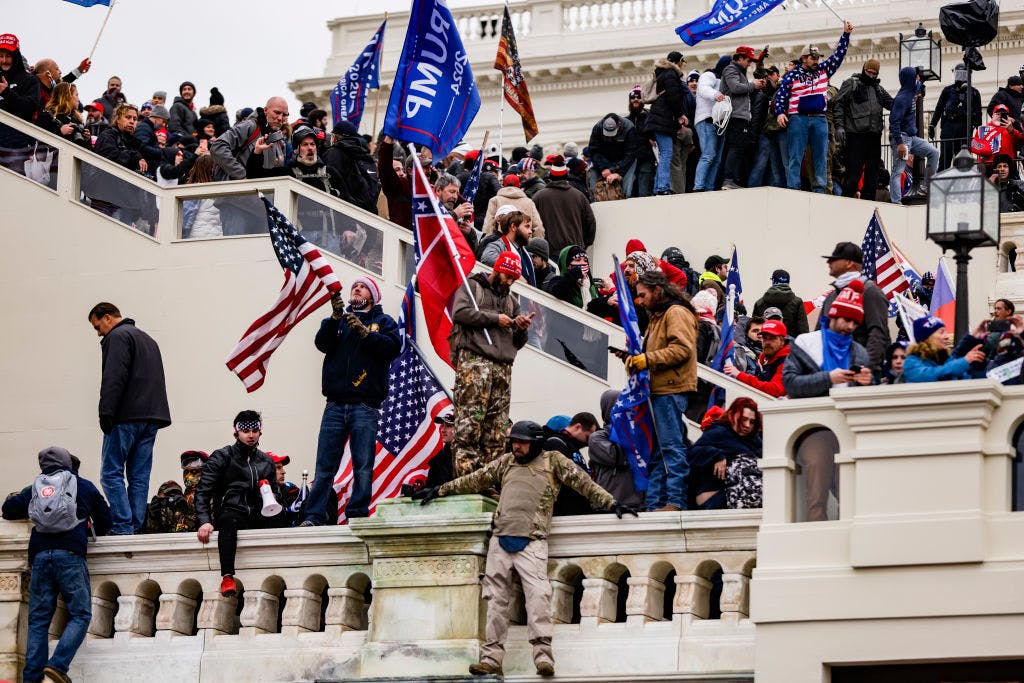Supreme Court To Hear Case That Could Be Salvation for Hundreds of January 6 Defendants — and Trump
The justices want to mull whether government prosecutors — including Jack Smith — overcharged hundreds of rioters and the president they supported.

The Supreme Court’s decision to hear a challenge to the charges brought against more than 300 January 6 defendants, including President Trump, threatens to upend one of the largest prosecutions in American history.
It means that at least four of the justices voted to take up the question of whether a law passed to deal with financial auditing in the wake of Enron and Arthur Andersen, the Sarbanes-Oxley Act, can be used to prosecute those involved in the chaos at the Capitol. Prosecutors apparently like the long sentences available under SOX, as the law is known.
The rub, though, is whether Sarbanes-Oxley’s “obstruction of an official proceeding” charge and its requirement of a “corrupt” intent is a fit for what transpired on January 6. In Fischer v. United States, now on the court’s docket for this spring, a January 6 defendant, Joseph Fischer, challenges his conviction on what he calls “anti-shredding provisions.”
Mr. Fischer was charged with seven counts. He is appealing only the one that prohibits obstructing “a proceeding before the Congress” and observes that he only reached the Capitol “well after Congress recessed.” His other charges are a medley of assault, disorderly conduct, and trespassing. Mr. Fischer’s case arrives at the court linked with those of two other similarly situated defendants, Garrett Miller and Jacob Lang.
Section 1512(c) — the law in question — targets “whoever corruptly . . . obstructs influences, or impedes any official proceeding, or attempts to do so.” A gander at its legislative history discloses its taproot was, as a lower court judge put it, in “Congress’s focus on deterring fraud and abuse by corporate executives.” In 2002, when the law was passed, reports of shredded documents loomed large.
That context was dispositive for the district judge, Carl Nichols, who first heard the case. He found for Mr. Fischer and dismissed the Sarbanes-Oxley charge. On appeal, though, a fractured panel of the United States Circuit Court for the District of Columbia Circuit reinstated the charge, allowing the government’s expansive view of the law’s ambit to stand.
Mr. Fischer calls this ruling “an extraordinary and unprecedented extension of the statute’s reach.” It has been used on a mass scale with respect to January 6. Now comes the Supreme Court to say that it wants to reconsider that decision. The Department of Justice — and Special Counsel Jack Smith — likely find it attractive because of that two-decade maximum sentence, a stiffer penalty than all the other charges it has issued save seditious conspiracy.
The Nine will mull whether, as the circuit riders put it, Section 1512(c) “applies to all forms of corrupt obstruction of an official proceeding” or is soldered more tightly to the world of accounting and tax preparation. The Biden administration did not want the high court to take up the case. President Biden contends that in any event, the mob at the Capitol intended to obstruct an official proceeding — the certification of the vote confirming Mr. Biden as America’s president.
Mr. Trump, like Mr. Fischer, is charged with other crimes along with the Sarbanes-Oxley count. The 45th president also stands accused of conspiring to deprive Americans of the constitutional right to vote and another conspiracy count. He could, though, contend that his case should be paused until the Supreme Court rules on this question, likely in June. His trial is scheduled to begin on March 4.
Matters relating to Mr. Trump are piling up on the court’s docket. It has fast-tracked an appeal to decide the scope of presidential immunity, which, if granted, could shield him from this charge along with any others. That question, though, relates to one man. The fate of hundreds hangs on whether the DOJ’s wielding of Sarbanes-Oxley is warranted.
It wouldn’t be the first time that a prosecution in which Mr. Smith had a role was deemed excessively aggressive by the Supreme Court. In 2016, it unanimously overturned Mr. Smith’s conviction of the governor of Virginia, Robert McDonnell, for bribery. Mr. Smith then headed the DOJ’s Public Integrity Section, under which the case against Mr. McDonnell was brought.
After the government secured convictions against Mr. McDonnell on all 11 counts at the district court level, the justices ruled that Mr. Smith’s team failed to show an actual quid quo pro, as required by law. The prosecution, though, ended Mr. McDonnell’s political career and opened the way for a Democrat, Terry McAuliff, to be elected to succeed him.

